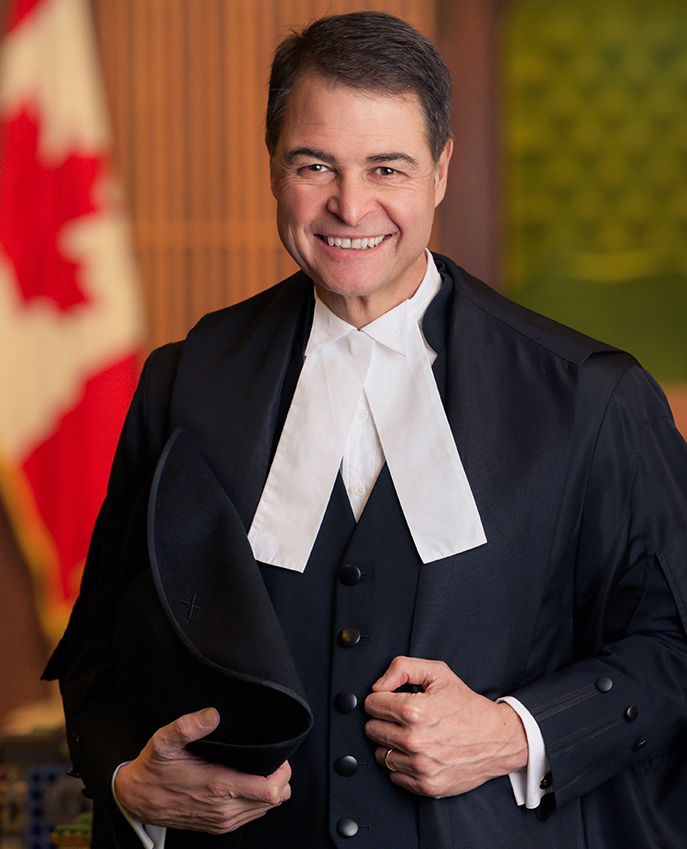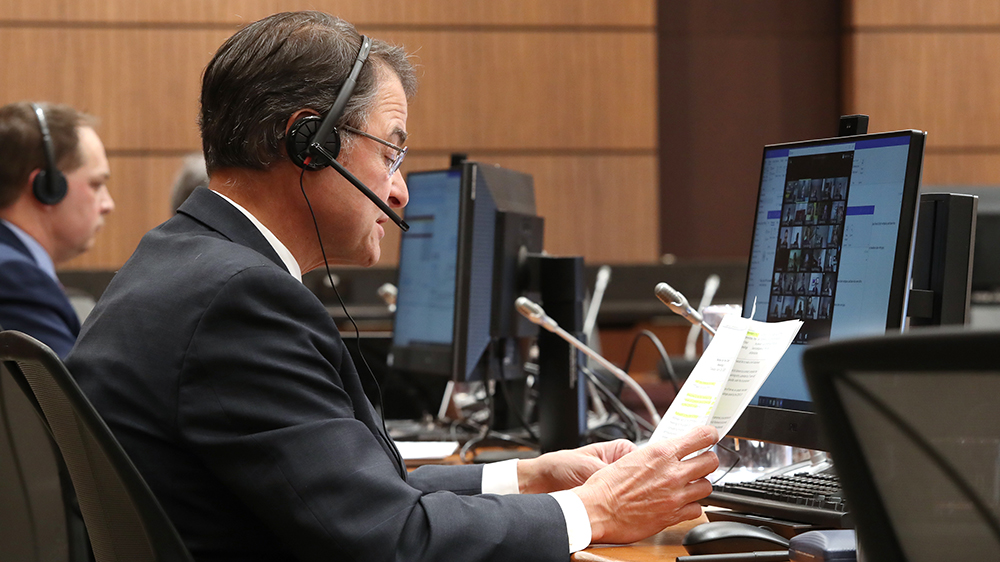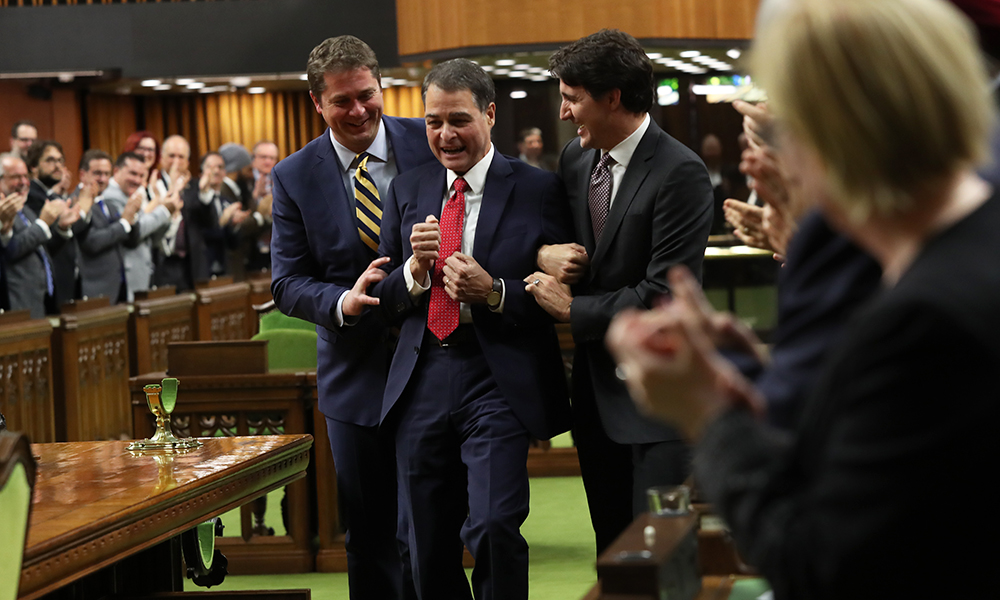House of Commons Speaker Anthony Rota (BA '83) was presented an unprecedented challenge in March 2020 when it became clear that Canada’s 338 Members of Parliament could not meet in person as a group for the foreseeable future due to COVID-19.
"How do we make this function?” Rota recalls thinking at the time. “It was a case of having a job to do and we needed to continue."
As Speaker, Rota is responsible for ensuring the orderly flow of business in the House of Commons and that parliamentary rules and traditions are upheld. When COVID-19 struck, he wanted to ensure that all members would feel at ease with any new system, that it worked seamlessly, and that it resembled traditional meetings of MPs in the House of Commons.
Rota consulted with the House of Commons clerk, table officers and information technology team to investigate how the House might continue to operate. The all-party Procedure and House Affairs Committee also considered the question.

Laurier graduate Anthony Rota is the 37th Speaker of Canada's House of Commons.
The result was the creation of a hybrid meeting format in which a small number of MPs attend the House of Commons in person and the remainder take part virtually from their home communities. MPs have continued meeting in a hybrid format as the pandemic has progressed.
“One of the biggest challenges with the hybrid system was ensuring connectivity,” Rota says. “It is a reality that not all of Canada is served equally as far as internet connection goes and that's an issue that keeps coming up.
– Speaker Anthony Rota
“But the biggest challenge I found was ensuring that parliamentary privilege is respected. Parliamentary privilege is making sure that all MPs can perform their duties in the House. I didn't want anything to serve as an obstacle to any MP trying to express themselves or perform their duty."
Rota, the MP for Nipissing-Timiskaming, says House of Commons staff have done an exceptional job meeting operational challenges resulting from COVID-19. He also credits the house leaders of Canada’s major political parties, who frequently interact to ensure proceedings take place “in a manner as normal as possible.”
"My hat goes off to the house leaders,” says Rota. “They come up with a lot of the solutions because they are impacted directly. By coming together, they often find common ground.”
The flurry of activity to establish a new House of Commons meeting format followed what Rota calls the most difficult decision he has made since being elected Speaker by fellow MPs in December 2019: ceasing the functions of the House.
“The decision was made by the House of Commons Board of Internal Economy, which I chair, but the directions had to come from my office,” Rota recalls. “On March 13, 2020, we stopped all visitor access to the House of Commons and the parliamentary precinct was closed down to public tours. Committees could not travel or do their work, and all parliamentary functions and events in the House of Commons and the precinct had to be cancelled. It was not an easy decision to make because that really shut down everything that was going on in Parliament."
The work of Parliament has resumed since then and Rota’s many duties as Speaker have continued, although differently than for any other House of Commons Speaker in Canadian history. As well as ensuring that rules and decorum are followed in the House, the Speaker is responsible for the administration and finances of Parliament Hill, as well as its 1,800 employees. The Speaker is also required to fulfill diplomatic duties, meeting with leaders, dignitaries and fellow speakers from around the world. Many of those meetings now take place online.

Speaker Anthony Rota leads a special committee meeting focused on the COVID-19 pandemic.
In September, Rota took part in the virtual Speakers of the G7 conference, hosted by U.S. House of Representatives Speaker Nancy Pelosi. During the conference, themed “Addressing the Climate Crisis with Economic and Environmental Justice for All,” Rota presented a speech entitled “Working Together: Harnessing International Climate Cooperation to Address Racial and Economic Equality.” He says he values the opportunity to share ideas with leaders and dignitaries, especially when discussing pressing issues such as climate change.
"I honestly believe people want to see something done about climate change and make sure the effects are minimized and eventually reversed,” says Rota. “But it has to be done with the cooperation of all G7 countries and all Canadian political parties. I believe it starts with treating people as equals and coming together and making those changes."
━
As Speaker, Rota is responsible for significant decisions regarding members’ behaviour in the House of Commons. Following his election as Speaker in December 2019, he said to members: “I ask one favour of all of you: every time you get up, let’s make sure our friends, family and children are proud of us within this House.”

A parliamentary tradition: Newly elected Speaker Anthony Rota is dragged to the Speaker’s chair by Prime Minister Justin Trudeau and then-official opposition leader Andrew Scheer following his election as Speaker of the House of Commons.
He says MPs have so far met his request.
“Overall, members have been respectful and cooperative,” says Rota. “There's been the odd outburst during a very heated debate or a very passionate speech, but it has not been unmanageable and has been working out very well."
In addition to established rules, Rota says he focuses on a guiding principle when fulfilling his duties as Speaker.
"The question I ask myself before saying something is 'how would I feel if that was said to me?’” says Rota.
“By putting yourself in the place of the person who is receiving the comment, you should have a good feeling of whether it is right or wrong. I believe it is no different in the chamber. It's a guiding principle I've lived by all my life."
━
Rota began his political career as a municipal councillor in North Bay, Ont. from 1994 to 1997. He entered federal politics in the 2004 election, becoming MP for Nipissing-Timiskaming, and was returned to the House of Commons in 2006, 2008, 2015 and 2019. He served as chair of the national Liberal caucus from 2007 to 2011 and as assistant deputy Speaker of the House of Commons from 2015 to 2019.
Rota says his interest in politics was fostered from an early age, noting that he's always admired those who choose politics as a profession.
“My father really believed in civic duty and we discussed politics quite often,” says Rota. “In our household, we would watch leadership conventions like hockey fans watch the Stanley Cup playoffs. It didn't matter if your team was in the game or not, you took interest to see how the game was played. And that's what laid the foundation for where I am today."
Rota says he is honoured to serve as the 37th Speaker of the House of Commons and to be the first Speaker of Italian descent. His election to the position brought with it a swell of emotions.
"The feeling of being chosen by your peers to take such a position is beyond description,” says Rota. “It is emotional and you feel that you have a challenge ahead of you because your peers believed in you. They elected you and you have the responsibility to live up to their expectations. To me, that is something I am very proud of."
While Rota’s time as Speaker has presented unexpected obstacles due to the COVID-19 pandemic, the House of Commons continues to function and MPs have continued performing their duties. He says that is a credit to the staff who work behind the scenes, as well as MPs themselves.
"We've had some challenges,” says Rota. “But the members have done very well and the business of the House of Commons has continued.”